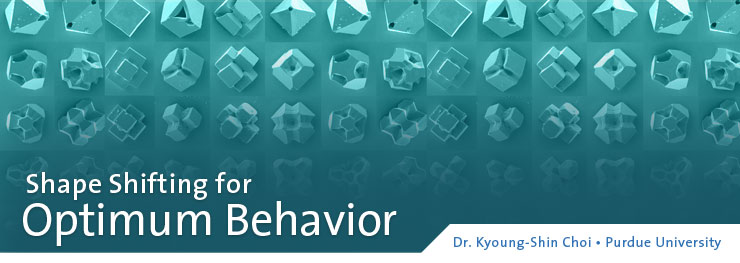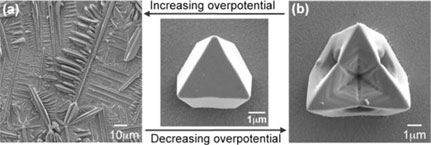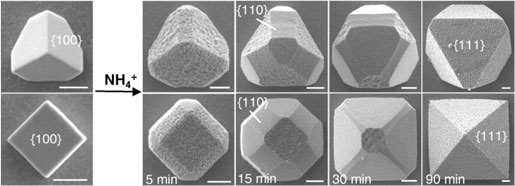


| Electrochemical Control of Material Shapes |
When Dr. Kyoung-Shin Choi talks about her work, her excitement is palpable. She likens her research to exploring a new frontier. "There are numerous materials and systems that we can improve using our methods and understanding," she says. "Basically, we'll never get bored." Dr. Choi is an associate professor of chemistry at Purdue University, where she and a team of eight graduate students and two postdoctoral researchers are investigating electrochemical control of material morphology. Essentially, they want to elucidate how the shape of inorganic materials on a nano and micro scale affects the materials' properties and, based on this knowledge, how to create optimum shapes that will bring about highly desired behavior.

Figure taken from Dr. Choi's research
Choi uses electrodeposition as her primary means of shape control, an idea that was conceived during her postdoctoral work years ago. Electrodeposition is a process by which desired materials are grown on a conductive substrate immersed in solution. Applying a specific amount of current triggers oxidation or reduction of ions. The benefit of this procedure is the exceptional level of control that can be exerted over the material's growth.
What started off as a methodological study about modifying shapes now has more potentially practical and imminent applications. Ultimately, this knowledge will prove most useful in the development of highly efficient, low cost catalysts and electrode materials such as those found in solar cells and batteries. For example, in solar cell technology, a poly crystal-based electrode (meaning that the electrode is composed of many tiny particles) is the cheapest form of electrode to manufacture. However, they are not as efficient as single crystal-based electrodes. "As we look at the particles," Choi says, "we can see why it is very important to learn how to engineer the shapes of the individual crystals and also regulate their connectivities to improve the efficiency of these devices."

Figure taken from Dr. Choi's research
"Controlling the shapes of materials is as important as discovering a new material," says Choi. The most exciting prospects for her are the endless possibilities of shape control the shape can always be improved to fit a specific application. The other exciting prospect, particularly for her students, is the opportunity to work on a project with practical ramifications. "Our research can make a real impact for making better electrode materials for clean energy production devices" explains Choi. "My students are intrigued by the possibility that what they study can directly contribute to the improvement of their everyday lives."
A more detailed description of Dr. Choi's research topic, Electrochemical Control of Material Shapes, can be found here.